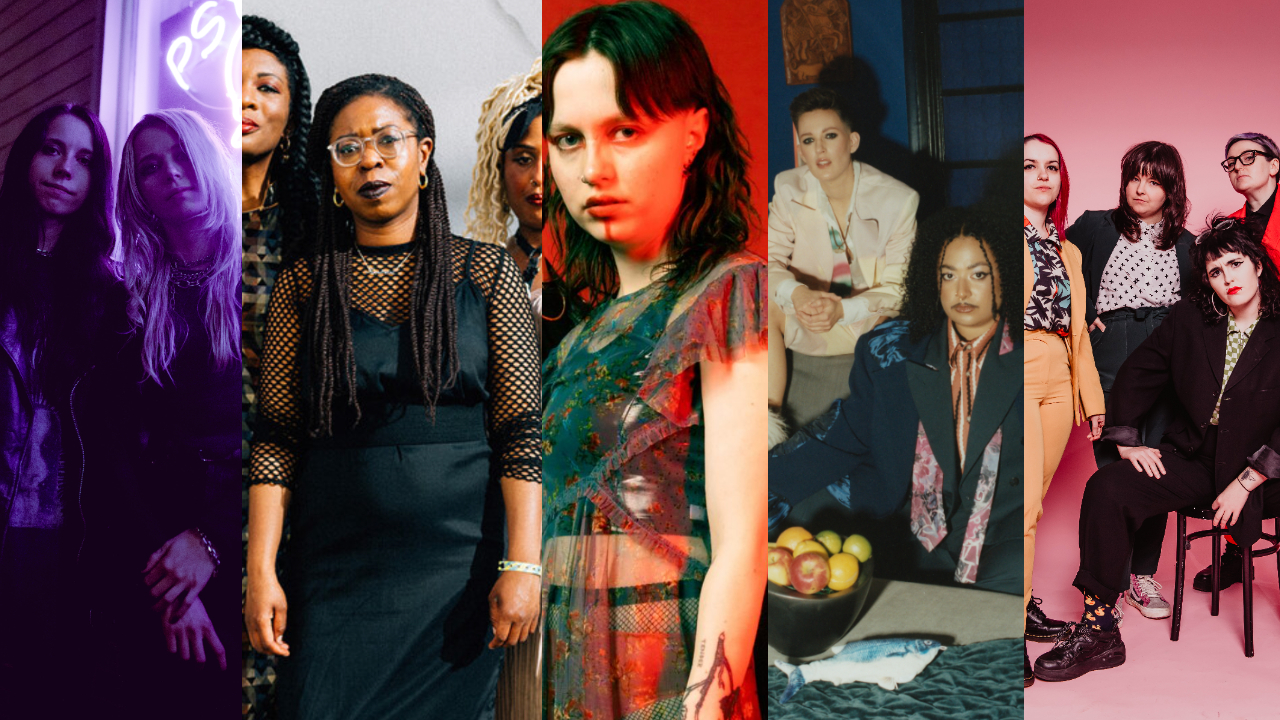The riot grrrl boom of the early 1990s was a game-changer for women in punk that inspired a generation of young feminists to pick up guitars and find like-minded activists to take a stand against misogyny. Bands like Bikini Kill, Sleater-Kinney and Bratmobile first emerged in Washington state and quickly spread their message of liberation and loud guitars across the US and later, the world. But the movement declined almost as suddenly as it began, with many of the original groups disbanding by the mid-'90s.
Although it did a lot of good for women in alternative music, riot grrrl was fundamentally flawed in its politics. It predominantly focused on white, middle-class women, often marginalising women of colour and outrightly excluding trans women.
But the spirit of riot grrrl has not been forgotten by the wave of up-and-coming bands who are reviving the subculture in their music, politics and DIY practices. Not only are they keeping the spirit of riot grrrl alive and thriving, but they’re actively working to make it a more inclusive and intersectional space that celebrates trans people and people of colour.
Here are five modern bands defining the new generation of riot grrrl punk.

Softcult
Softcult’s first three EPs are more shoegaze and dream-pop in style, but their DIY approach to their music is pure riot grrrl. Twin siblings Mercedes and Phoenix Arn-Horn record and produce their songs in their home studio in Ontario and they’re continuing the time-honoured riot grrrl zine tradition with their monthly publication SCripture, which follows in the xeroxed, collaged footsteps of the original movement.
Like those who came before them, Softcult are raw and straight-to-the-point in their lyrics, calling out injustices faced by themselves and others and condemning discrimination and abuse on no uncertain terms. Their most powerful track, BWBB, for example, was written in response to the murder of Sarah Everard in 2021. Outspoken in every facet of their art, Softcult have made it clear that the new generation of riot grrrls will not stand for racism, classism or transphobia in the scene.
Big Joanie
Big Joanie are making currently making their name in America as a recent signing to Kill Rock Stars, the former home to influential bands like Heavens to Betsy and Bratmobile. But on this side of the Atlantic, the band have been putting the work in for years to build up the feminist DIY scene in the UK. Their music blends the stripped-down style of Sleater-Kinney with the modern post-punk revival, and their live shows are unmissable.
As well as their two widely-acclaimed albums, a MOBO nomination and a near-constant touring schedule, the band are committed to recognising and celebrating the contributions that people of colour have made to punk. Guitarist (and writer) Stephanie Phillips helped create Decolonise Fest, “the UK's first music festival created by and for people of colour.”
Witch Fever
Witch Fever have a good helping of riot grrrl sounds mixed into their signature doom-punk style, but it’s their intense, in-your-face live shows that are most reminiscent of the DIY feminist punks of the 90s, with singer Amy Walpole often jumping into the crowd to perform most of the band’s set. Their skills on the stage haven’t gone unnoticed, leading to the quartet bagging high-profile support slots with the likes of IDLES, Poppy and My Chemical Romance. Fierce champions of feminism and trans rights, their politics are baked into everything they do, from the songs they write to the Witch Fever Book club they set up in March this year.
Dream Nails
London four-piece Dream Nails are another group who are reviving the DIY approach to punk that was championed by the early riot grrrl bands – an attitude most eloquently summed up in their 2017 single DIY. Their latest album Doom Loop, released on October 13, combines the outspoken activism of '90s riot grrrl culture with the wit and humour of earlier punks like X-Ray Spex. However, the vulnerability and nuance with which they write their lyrics is completely their own – check out their recent track, Sometimes I Do Get Lonely, Yeah on incel culture and radicalisation.
Problem Patterns
The next big thing to come from Belfast’s emerging punk scene, Problem Patterns are already a favourite of riot grrrl legend Kathleen Hanna, who chose the quartet - Beverley Boal, Bethany Crooks, Ciara King and Alanah Smith - to support Le Tigre in London earlier this year. They reject traditional band dynamics, with each member getting a turn on vocals. Their debut album Blouse Club, which arrives October 27, has everything from their look at an NHS in crisis on Who Do We Not Save to empowering fight songs against homophobia and transphobia on Lesbo 3000 and TERFs Out. Pity Bra is a more direct homage to the movement that tells the story of a Sleater-Kinney concert in Dublin.
